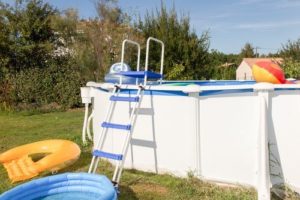Above Ground Pools, Design Issues & Personal Injury
 Enjoying time is the pool is a popular pastime for Floridians who want to cool off and make the most of summer. While pools can be a great source of entertainment and exercise, there are always risks, including those involving drownings and near-drowning events, slip and fall accidents, and diving injuries. Some of these risks can be mitigated with swimming lessons, safety protocol, and proper supervision. Some risks, however, may stem from design issues that make certain types of pools inherently unsafe.
Enjoying time is the pool is a popular pastime for Floridians who want to cool off and make the most of summer. While pools can be a great source of entertainment and exercise, there are always risks, including those involving drownings and near-drowning events, slip and fall accidents, and diving injuries. Some of these risks can be mitigated with swimming lessons, safety protocol, and proper supervision. Some risks, however, may stem from design issues that make certain types of pools inherently unsafe.
Flaws or defects in the ways pools are designed commonly relate to above ground swimming pools. These pools can be purchased by consumers who want less expensive alternatives to in-ground swimming pools, as well as easy installation. Although they provide certain benefits to consumers, they also pose unique risks and hazards, including:
- Ladders / Decks – Above ground pools are often constructed with ladders and decks that allow swimmers to enter and exit the pool. The correct positioning of ladders and decks is critical to reducing the risks of accidents, as they can become covered in water and create dangerous slipping hazards that may result in broken bones, brain injuries, spinal cord injuries, and other serious or fatal injuries.
- Collapses – The design and construction of above ground pools is crucial to ensuring they are safe for their intended use. When product manufacturers make errors during the design or manufacturing phases that make pools inherently unsafe (such as poor workmanship, poor quality control testing, or low quality materials), they sacrifice the integrity of the pool and can make them more susceptible to collapsing and injuring consumers.
In addition to dangers posed by design issues, above ground pools may also pose risks as a result of negligence by homeowners or businesses:
- Customization – Some above ground pool owners may choose to customize their pools by adding their own ladders or decks, or even slides and pool toys. Unfortunately, these additions can create a number of potential hazards, including slip and fall dangers or sudden breakage and collapse.
- Poor supervision – Above ground pools are typically much shallower than in-ground pools, which poses risks to swimmers who may dive into the pool and suffer head, neck, or spine injuries as a result. This is why it becomes critical for homeowners or businesses that allow visitors and guests to use above ground pools to ensure swimmers are adequately supervised. This is especially true for young children, who face the greatest risks of diving and drowning injuries. Although pool owners may hold on to misconceptions that above ground pools are less dangerous than traditional pools because they are more shallow, drowning accidents can occur in nearly any level of water. In fact, above ground pools accounted for nearly 20% of all reported drownings in 2017, according to the U.S. Consumer Product Safety Commission (CPSC).
- Lack of fencing/barriers – Pools of any type should be sectioned off by fences or barriers to prevent children from gaining access. While supervision is key to reducing risks, barriers and fences provide an additional layer of safety when kids find their way outside and into trouble. Without these barriers, an unsupervised child can enter pool areas or the water and place themselves in danger of suffering preventable harm.
When it comes to injuries involving above ground pools, victims may be able to pursue personal injury cases if their injuries resulted from negligence. Determining how negligence plays a role in an accident, as well as who can be held at fault and liable for serious injuries, will depend on the unique facts and circumstances involved. For example, these accidents may stem from:
- Defectively designed or manufactured pools (product liability)
- Homeowners who install unsafe ladders, decks, or slides (premises liability)
- Negligent supervision by homeowners or businesses
- Failures to warn or address potential hazards
Clark, Fountain, La Vista, Littky-Rubin & Whitman has cultivated national recognition for our success handling difficult cases involving defective products, serious injuries, and wrongful death. Over the years, our award-winning lawyers have leveraged their experience in these areas to secure more than $1 billion in compensation for our clients. If you have questions about your rights following a swimming pool accident, contact us for a free case evaluation.
